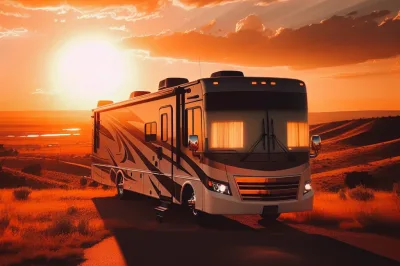Table of Contents

The Power Shift: Choosing Between RV Solar Batteries and Conventional Batteries
When you’re out on the open road, the last thing you want to worry about is your RV’s power source failing you. The choice between solar and conventional batteries is more than just picking a power source; it’s about choosing a lifestyle. With the rise of eco-conscious living and advancements in technology, solar batteries are becoming a popular choice for RV enthusiasts. But are they the right choice for you?
Key Takeaways: Solar vs. Traditional Power Sources for Your RV
- Solar batteries offer a sustainable and eco-friendly power source, reducing reliance on traditional power grids.
- Conventional batteries, such as lead-acid, are well-tested and generally have a lower upfront cost.
- Lithium solar batteries are lighter, more efficient, and have a longer lifespan than conventional batteries.
- The initial investment for solar can be higher, but potential savings over time can offset the cost.
- Understanding your power needs and usage patterns is crucial in choosing the best battery for your RV.
Navigating the Energy Landscape: Conventional RV Batteries
Conventional RV batteries have been the backbone of mobile living for decades. They’re reliable, readily available, and many RV systems are designed with these in mind. But as we become more energy-conscious, it’s important to ask: are they still the best option?
Understanding Lead-Acid Batteries
Lead-acid batteries are the traditional choice for RV power. They come in two main types: starting batteries, which provide a quick burst of energy to start engines, and deep-cycle batteries, designed for prolonged energy output. While they’re cost-effective and widely compatible, they also come with a weighty downside: they’re heavy and require regular maintenance.
The Pros and Cons of AGM Batteries
AGM (Absorbed Glass Mat) batteries are a type of lead-acid battery that’s sealed, spill-proof, and generally more durable. They charge faster and last longer than their flooded counterparts. However, they still fall behind when it comes to weight and energy capacity compared to the latest solar battery options.
Life Span and Maintenance Needs of Conventional Batteries
With conventional batteries, maintenance is key. Regular checks on water levels, cleaning terminals, and ensuring proper charging are all part of the routine. A well-maintained lead-acid battery can last up to 5 years, but it’s a commitment. Neglect can lead to reduced efficiency and a shorter lifespan.

The Rise of Solar: Harnessing the Sun for Your RV
Imagine the freedom of powering your RV with the sun’s endless energy. Solar batteries are revolutionizing the way we think about RV power, offering a cleaner, more sustainable way to enjoy the nomadic lifestyle. But it’s not just about being green; it’s about efficiency, cost savings, and convenience.
The Basics of RV Solar Battery Systems
Solar battery systems for RVs are composed of solar panels, a charge controller, a battery bank, and an inverter. The panels collect sunlight, converting it into electricity. The charge controller regulates this power, the battery stores it, and the inverter turns it into usable AC power for your RV’s appliances. It’s a seamless cycle of energy that keeps you powered up and ready to go.
Types of Solar Batteries: Lithium vs. Others
When we talk about solar batteries for your RV, lithium batteries often steal the spotlight. They’re the new kids on the block, offering high energy density, which means more power with less weight. Lithium batteries also boast a longer lifespan and can handle deeper discharge cycles without damage. But they’re not the only option. Lead-acid, gel, and saltwater batteries are also contenders, each with their own benefits and limitations. Your choice should be guided by your specific needs, budget, and the nature of your travels.
Comparing Solar and Conventional: A Detailed Breakdown
Let’s get down to brass tacks. Solar batteries and conventional batteries serve the same purpose but in very different ways. To make an informed decision, you need to understand how they stack up against each other in terms of cost, efficiency, maintenance, and more. It’s not just about the initial price tag; it’s about looking at the bigger picture of your RV lifestyle.
Evaluating Cost Over Time
Sticker shock can be real with solar batteries, as the upfront cost is typically higher than conventional batteries. But don’t let that initial number fool you. Over time, solar batteries can prove to be more cost-effective due to their longer lifespan and reduced maintenance. Plus, the ability to recharge with solar power means you’re less dependent on hookups and generator use, which can save you a bundle in the long run.
Assessing Energy Efficiency and Storage Capacity
Efficiency is where solar batteries really shine. They convert more of the energy they store into usable power, which means less waste and more time enjoying the comforts of your RV. When it comes to storage capacity, solar batteries, particularly lithium-ion, are hard to beat. They can store a significant amount of energy in a compact space, giving you the power you need without the bulk.
Installation and Space Considerations
Space is a precious commodity in an RV. Solar battery systems are generally more compact and can be installed in various locations, freeing up valuable space. Installation might be a bit more complex than simply swapping out a conventional battery, but the space and weight savings are worth the effort. Plus, once they’re in, solar batteries require very little fuss.
Environmental Impact and Sustainability
Choosing solar batteries is a step toward a more sustainable lifestyle. They’re cleaner, greener, and help reduce your carbon footprint. With solar, you’re not just taking from the environment; you’re working with it. This harmony with nature is not just good for the planet; it feels good for the soul, especially when you’re out exploring the great outdoors.

The Charging Conundrum: Performance in Real-World Scenarios
It’s one thing to look at specs and stats, but how do these batteries perform in the real world? Factors like charging speed, depth of discharge, and temperature tolerance all play a role in how your battery will serve you on the road.
Depth of Discharge: What Does It Mean for You?
Depth of discharge (DoD) is a term that refers to how much of a battery’s capacity has been used. Conventional batteries usually have a lower DoD, meaning you can’t use all of their stored energy without risking damage. Solar batteries, particularly lithium, can handle a deeper DoD, giving you access to more of their capacity and ensuring you have the power you need, when you need it.
Charge Time: Getting Back on the Road Faster
Time is precious, especially when you’re eager to explore. Solar batteries, especially lithium-ion, charge up faster than conventional batteries. This means less downtime waiting for your batteries to charge and more time enjoying your adventure. With efficient solar panels and a proper setup, harnessing the sun’s power can be incredibly quick, keeping your journey smooth and uninterrupted.
Temperature Tolerance: Facing the Extremes
RV life can take you to some extreme environments, from scorching deserts to freezing mountains. Conventional batteries can suffer in these conditions, with high heat causing accelerated wear and cold temperatures reducing capacity. Solar batteries, particularly lithium, have a wider temperature tolerance. They keep performing steadily, ensuring your comfort no matter where you park.
Decision Time: How to Choose What’s Best for Your RV Lifestyle
Choosing the right battery for your RV is a big decision that can impact your travels for years to come. It’s not just about picking solar or conventional; it’s about understanding your needs, your travel habits, and what you value most in your RV experience. Let’s walk through the key considerations to help you make the best choice.
Defining Your Energy Needs and Usage Patterns
First, assess how much power you really need. Do you stick to campgrounds with hookups, or do you prefer the freedom of off-grid camping? Consider the appliances you can’t live without and how often you use them. This will help you determine the capacity and type of battery system that’s right for you.
Balancing Initial Investment with Long-Term Savings
Yes, solar batteries can be a bigger investment upfront. But think about the long haul. They can last longer and save you money on maintenance and electricity costs. Crunch the numbers to see how the investment in solar compares with the ongoing costs of conventional batteries. It’s not just about the price tag; it’s about value.
Seeking the Best Fit: Tailoring Solutions to Your RV
Every RV and every RVer is unique. Your power system should reflect that. Maybe you need a robust setup for full-time living, or perhaps a smaller system for weekend getaways. Work with a specialist to design a solar battery system that fits your specific RV and lifestyle like a glove.
Switching to Solar: Implementation and Transition Strategies
Moving to solar power is a significant shift, but it doesn’t have to be overwhelming. With the right approach, you can smoothly transition to a solar setup that will power your travels for years to come. Here’s how to get started.
Steps to Convert Your RV to Solar Power
First, you’ll need to choose your components: solar panels, a charge controller, batteries, and an inverter. Then, plan your system layout, considering where to place the panels for optimal sun exposure and where to house the batteries. Next, install the components, or better yet, have a professional do it to ensure everything’s up to snuff. Finally, test your system and make any necessary adjustments. With these steps, you’ll be on your way to a greener, more efficient RV life.
Managing the Mix: Using Solar and Conventional Batteries Together
Don’t think you have to choose exclusively between solar and conventional batteries; they can complement each other. Hybrid systems combine the reliability of conventional batteries with the efficiency of solar. For example, you can use solar power as your primary source and keep a conventional battery as a backup. This approach ensures you’re covered in various scenarios, such as low-sunlight days or high-energy-use situations.
Making the Investment Last: Tips for Solar Battery Maintenance and Care
Investing in solar batteries is just the start. To get the most out of your investment, proper maintenance and care are crucial. This means regular checks, proper charging, and safe usage. With the right care, your solar batteries can serve you well for many years, making your RV adventures more sustainable and enjoyable.
Optimizing Your Solar Battery Lifespan
Maximizing the lifespan of your solar batteries involves a few key practices. First, avoid letting your batteries deplete completely; regularly recharge them before they hit a critically low level. Keep them at a moderate temperature to prevent damage from extreme heat or cold. Finally, use a high-quality solar charge controller to protect your batteries from overcharging or excessive discharge.
Troubleshooting Common Solar Battery Issues
Even with the best care, you might encounter issues with your solar batteries. If you notice reduced performance, it could be due to overuse, undercharging, or exposure to inappropriate temperatures. Check connections for corrosion or damage, ensure your solar panels are clean and unobstructed, and verify that your charge controller settings are correct. Addressing these common problems promptly can help you avoid bigger issues down the line.
Charting the Future: Innovations in RV Solar Battery Technology
The world of RV solar battery technology is constantly evolving. Innovations are making solar batteries more efficient, affordable, and user-friendly. As we look to the future, we can expect to see continued improvements that will make solar power an even more attractive option for RV owners.
Emerging Trends and Future Battery Improvements
Emerging trends in solar battery technology include advancements in lithium-ion compositions, solid-state batteries, and integration with smart technology. These improvements aim to increase energy density, reduce charging times, and extend battery life. Additionally, we’re seeing a push towards more sustainable materials and production processes, making solar batteries even greener.
How Upcoming Technologies May Influence Your Choice
As these technologies develop, they may influence your decision when choosing an RV power system. With the promise of longer lifespans, faster charging, and higher capacities, the benefits of waiting for the next big breakthrough might outweigh the advantages of current systems. However, it’s also important to consider the availability and compatibility of new technologies with your existing setup.
Frequently Asked Questions (FAQ)
You’ve got questions, and we’ve got answers. Here are some of the most common queries we receive about RV solar batteries and conventional batteries.
- Can I charge my solar batteries on cloudy days?
- How often should I check my solar battery system?
- What’s the best way to store my RV if I’m not using it for an extended period?
- Can I install a solar battery system myself?
- How do I know if my solar battery is fully charged?
- What should I do if my solar battery isn’t holding a charge as long as it used to?
- Are there any tax incentives for switching to solar power for my RV?
Can solar batteries be used in all types of RVs?
Yes, solar batteries can be integrated into virtually any RV model. The key is to ensure the solar system is appropriately sized for your RV’s power requirements and space constraints. Whether you have a compact van or a large motorhome, there’s a solar power solution that can be customized to fit your needs. It’s all about matching the system to your RV’s specifications and your energy usage.
How does the cost of maintaining solar batteries compare to conventional ones?
Maintenance is where solar batteries truly shine. They require significantly less upkeep than conventional lead-acid batteries. With no need to check water levels or clean terminals, solar batteries offer a ‘set it and forget it’ solution. This can lead to long-term cost savings, not just in terms of maintenance supplies but also in the time and effort saved.
What happens to solar battery efficiency in low sunlight conditions?
Solar batteries are most efficient under direct sunlight, but they don’t stop working when the skies are overcast. Efficiency does decrease, but your panels will still capture solar energy and charge the batteries, albeit at a slower rate. To combat this, you can increase your solar array size or battery capacity to ensure you have enough power to meet your needs, even on cloudy days.
Are solar batteries safe to use in an RV?
Solar batteries are generally very safe for RV use. They don’t emit gases like conventional lead-acid batteries can, and they’re sealed, reducing the risk of leaks. As with any electrical system, proper installation and regular inspections are crucial to maintaining safety. It’s always a good idea to have a professional review your system to ensure everything is up to code.
Is it possible to upgrade my existing conventional battery system to solar?
Upgrading to a solar battery system is a smart move that many RV owners are making. The transition involves adding solar panels, a charge controller, and potentially new batteries to your RV. It’s a straightforward process that can often be done without altering your existing electrical system. Plus, the benefits of switching to solar—like cost savings and increased independence—make it a worthwhile investment.
In conclusion, the shift from conventional batteries to solar power is a game-changer for RV enthusiasts. Solar batteries offer a sustainable, low-maintenance, and cost-effective solution that aligns with the freedom and adventure of the RV lifestyle. While the upfront cost may be higher, the long-term savings, environmental benefits, and convenience make solar batteries an increasingly popular choice among RV owners.
By understanding your energy needs, evaluating the long-term costs, and considering the practicalities of installation and maintenance, you can make an informed decision that enhances your RV experience. Embrace the power of the sun and let it propel you towards countless memorable journeys on the road.
- Boondocking RVs: Flexible Solar Solutions – 3 March 2024
- Renewable Energy Tips for Full-Time Boondocking RVers – 2 March 2024
- Boondocking Solar Power Systems: Sizing Options & Solutions for Motorhomes – 1 March 2024
